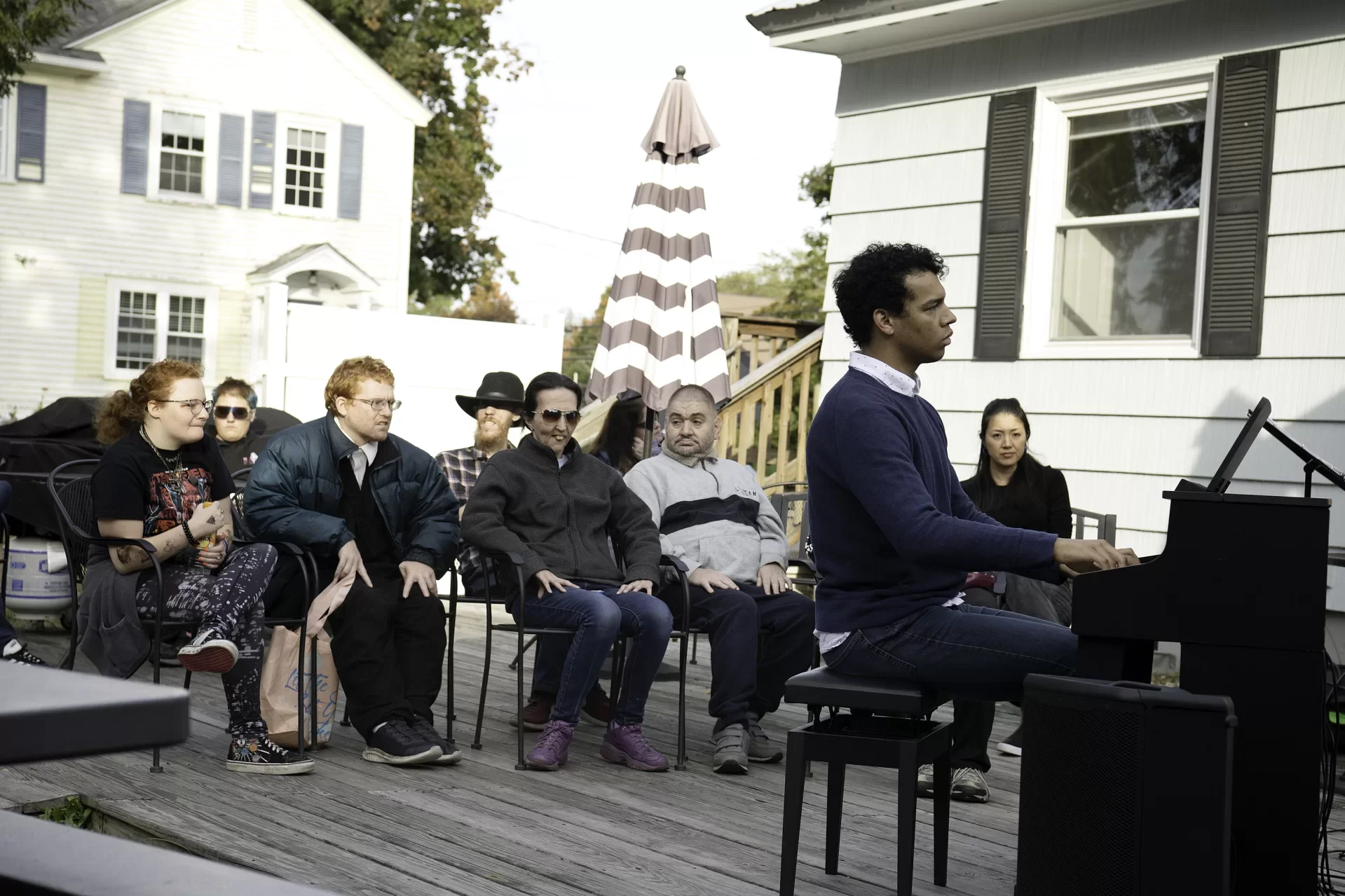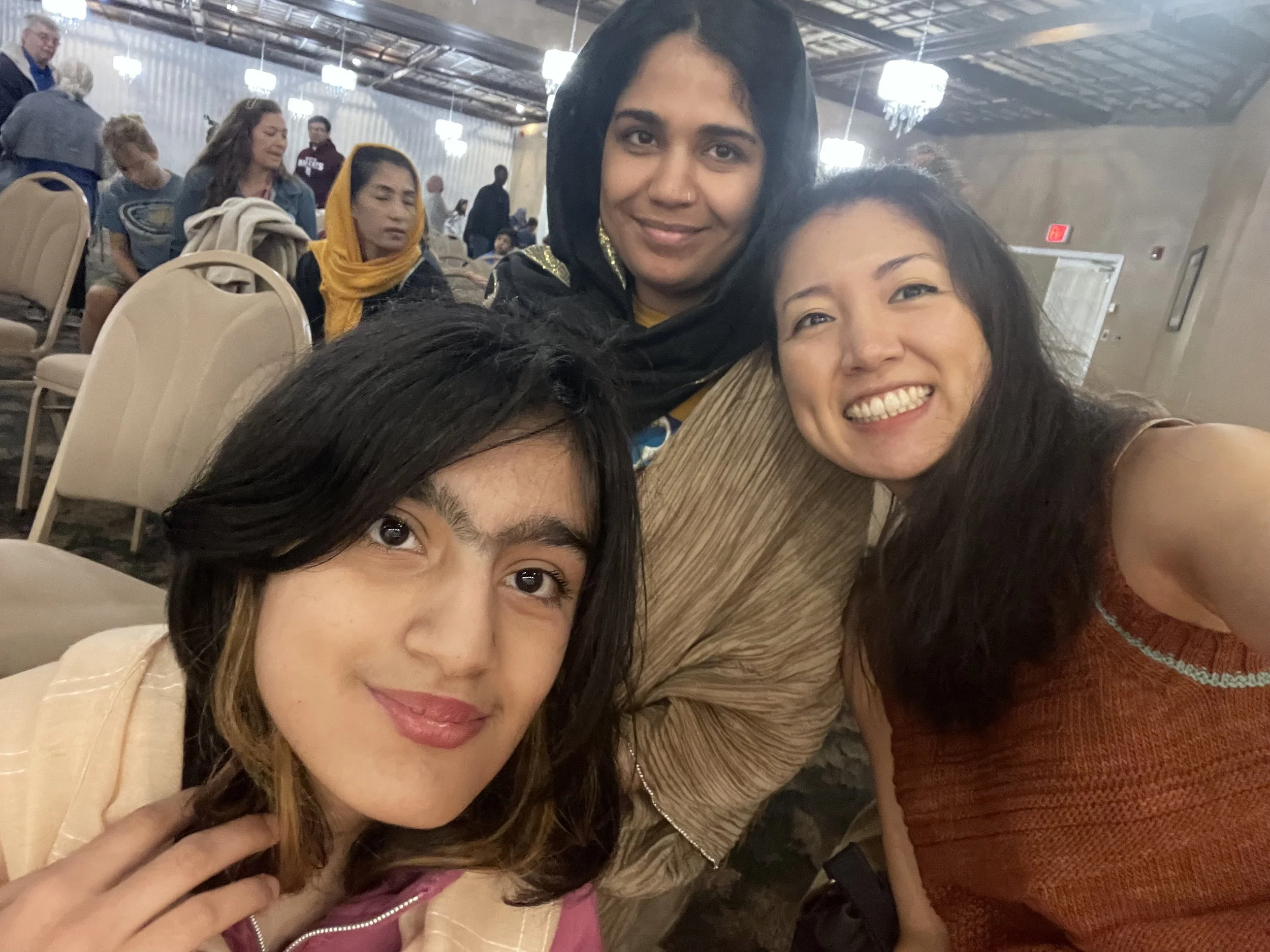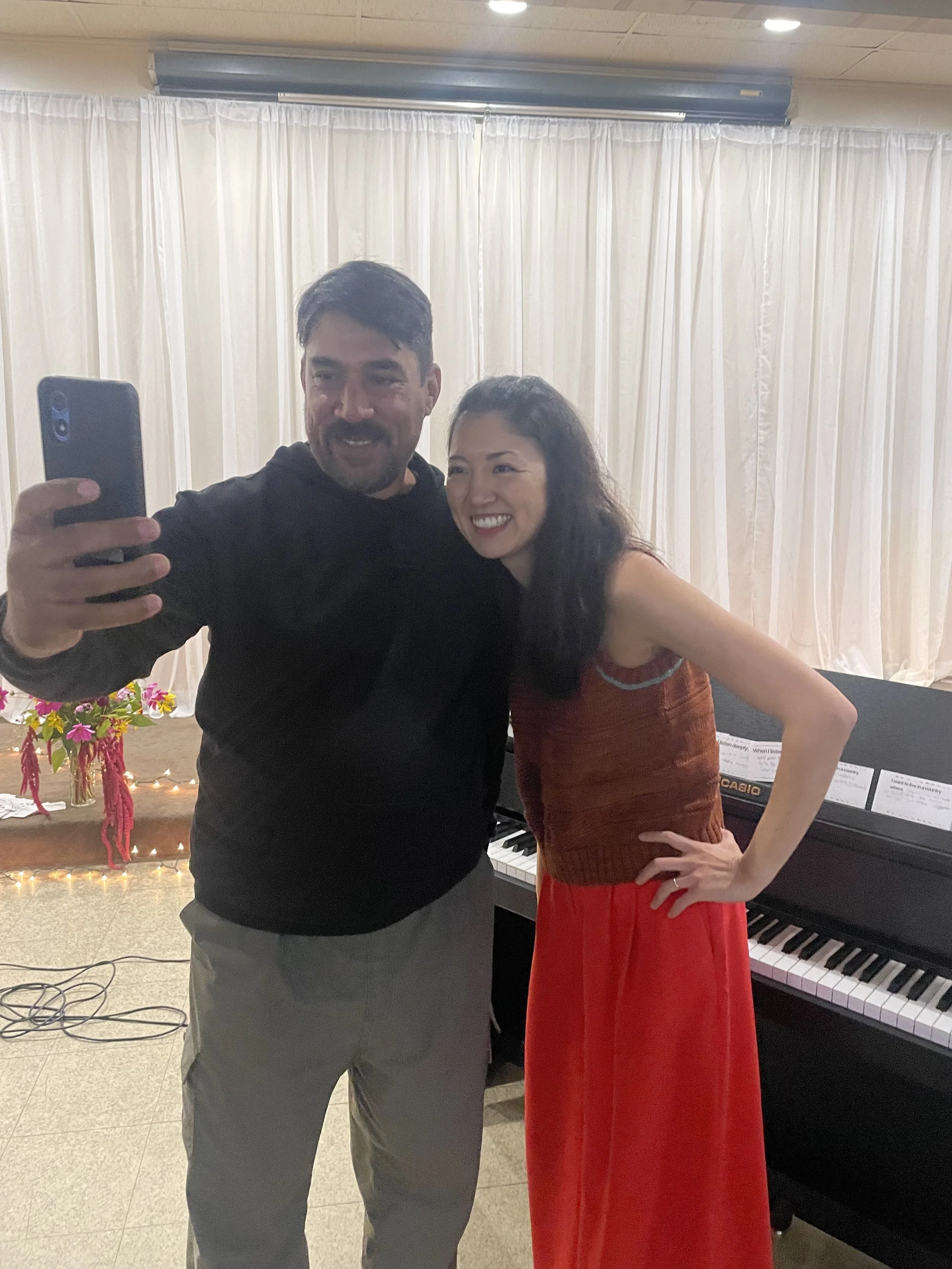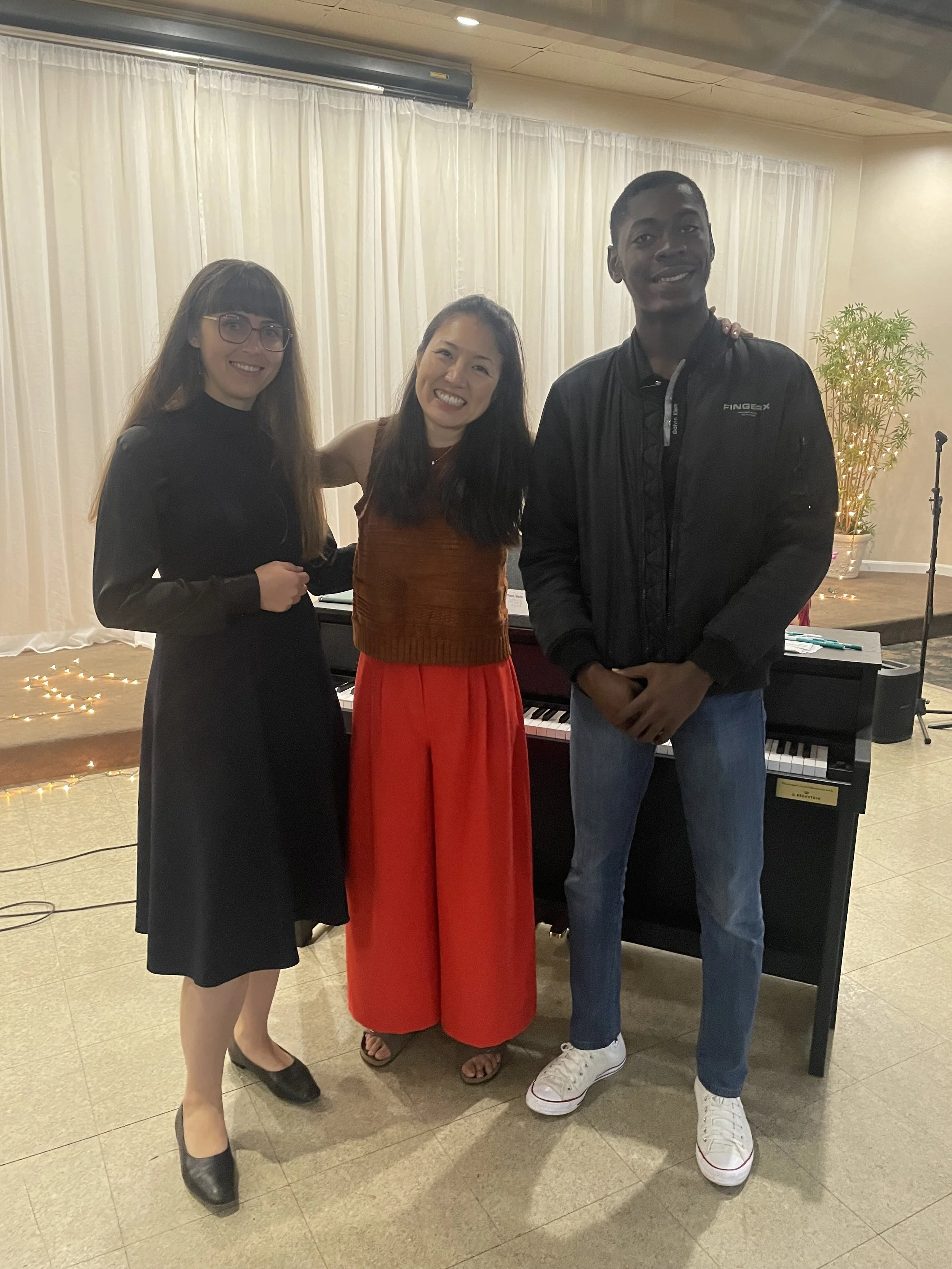Lewiston, Maine
Oct 4-5, 2024
Partner: Bates College
Presenters: Looking Ahead Clubhouse, Maine Immigration and Refugee Services (MEIRS)
Population: 38,772
We were down to the final two days of tour, and drove just an hour from Skowhegan to Lewiston, the second populous city in Maine. I had wanted to include Lewiston for two reasons: 1. The 2023 mass shooting is still fresh in our memories and I wanted to give the city some extra love, and 2. Lewiston is one of the handful of places in Maine where there is racial diversity. They are known for having a large migrant/immigrant population, and given that immigration is such a hateful and divisive topic in this country and especially this election season, I wanted to make sure to include this community in Gather Hear Maine.
It turned out my friend (vocalist and musicologist) Zen had just become a professor at Bates College, so we decided to partner up by including Bates College piano students in our Lewiston concerts. Zen joined me in performance too - thank you so much!
On Day 9 of tour, we performed at Looking Ahead Clubhouse, a member-led mental illness support group. Clubhouses are nationally accredited and exist all over - we’ve partnered multiple times with the Point After Clubhouse in Lawrence, Massachusetts, and love performing for them, so I wanted to seek out another Clubhouse partnership. Being at Looking Ahead Clubhouse felt familiar, like home. We set up outside in their courtyard on a breezy, blue sky fall day. Student performers Jahan Baker-Wainwright and Marrich Somridhivej did a wonderful job performing and telling the audience a bit about their backgrounds and the music.
Below are some of the response notecards that our audience filled out:
Day 10 was maybe the most highly anticipated concert for me, and also the last one of Gather Hear Maine! Up until now, our audience had mostly been homogeneous in race, with Maine being one of the whitest states in the country. However, in Lewiston, there is a sizable immigrant and migrant population, with immigrants making up 16% of the city’s population as of 2021. In the last decades, thousands of Somalis have moved to Lewiston (and Portland) and shaped the economy and culture of the city. These days, immigrants come from Afghanistan, Ukraine, Nigeria, Congo, Poland, Azerbaijan, Venezuela, Angola, and dozens more countries. Several immigrant support nonprofits exist in Lewiston, and I was lucky to partner with Maine Immigration and Refugee Services (MEIRS).
MEIRS understood my vision right away, and suggested the local Ramada Inn as the venue, where about 100 recent migrants were being provided temporary housing. They told me MEIRS doesn’t usually hold events for large groups, for a very simple logistical reason: no one speaks the same language. Because migrants come from so many different countries, and almost no one speaks English, many of their events are catered to a specific group that speaks the same language. Music is useful in this way, in that it could reach folks of different tongues.
But, I worried about Western classical piano music being too narrow a niche within a worldwide context, and that some audiences might feel alienated by it. So, with a lot of effort, Zen and I learned a very popular Somali lullaby. Much of the world’s music is not written down in Western musical notation, and/or depends a lot on improvisation that is informed by understanding of the musical tradition, or simply doesn’t translate well to piano. So although we wanted to represent more countries musically, we were lucky that at least some Somali music has been published in an accessible format by folks in Minneapolis (an educational textbook “The Rhythm of Somalia”), which also has a large Somali population. Zen studied the diction carefully by listening to recordings, and I made a simple piano part by referencing a YouTube music video. Additionally, we performed the Japanese folksong “Sakura sakura” to represent our Japanese heritage, in the spirit of cultural exchange.
The Ramada Inn was very run down and outdated (it has been condemned twice recently for violation of housing codes), but the front desk workers were nice, and MEIRS staff and volunteers made the ballroom look as good as possible by decorating it with string lights and fresh flowers. The mayor of Lewiston was there to support, and helped me move the piano and vacuumed the room. We were expecting strong turnout on this Saturday morning, but scarcely anyone had turned up by the time we started - a couple Bates folks supporting us, and an out-of-place but perfectly content German tourist couple who had somehow ended up booking a room at the Ramada. There’s always one or two concerts per tour where there’s terrible turnout - it’s just part of the game when you’re putting on classical music concerts where there’s no precedent of it. This Maine concert had had no such concerts, so I shrugged my shoulders and guessed this last concert was going to be the unfortunate one.
But, as the program progressed, more and more people walked in through the doors. When I started my last selection, people were still walking in through the doors, and by the end we had a sizable crowd including many children. The Somali lullaby was received warmly and enthusiastically, with many people taking videos for prosperity. Although many people didn’t speak English, they came up to me to take selfies with me, and a girl even asked for my Whatsapp, which I guess was her way of showing connection. I got to speak with an Afghan young woman fluent in English, who told me about her education background, life as a new mother, and the job search process in Lewiston.
I’m not sure what they thought or how they felt about the classical music I performed, but I believe that what the audience felt was that I was there to give something to them, and I felt like that was appreciated at least. I hope that the music transported them for a short time to a place far away from the Ramada; I can only hope.
And so the seventh Gather Hear Tour concluded. Lucky seven - this one was full of highs, with truly no “bad” concert. I credit that to the strength of partnerships I was able to forge in the state of Maine with the local presenters - thank you to everyone who helped organize a concert, attended one, or donated to support our activities. In this turbulent pre-election season (and the imminent destruction of life as we knew it by the new administration, which I could not have imagined at the time of the tour), music gave us an oasis.















